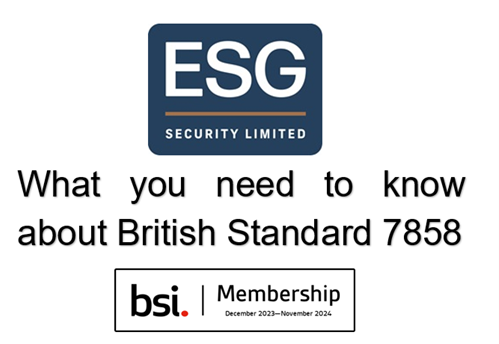Screening of individuals working in a secure environment – BS 7858 – is the best practice procedure published by the British Standards Institute (BSI) for the background screening of individuals employed in a secure/security environment. It is designed to assist security companies with assessing the suitability of individuals for a role in security, and to identify any potential risks that could pose a threat to the business.
BS 7858
The BS 7858 vetting includes:
· Identification check: This check verifies the identity of the individual, typically using a passport or driving licence.
· Work history (including education and gap periods) check: This check verifies the individual’s employment history, including their job titles, dates of employment, and reasons for leaving. It also checks for any gaps in employment and education.
· Basic Disclosure and Barring Service (DBS) check: This check reveals any unspent convictions or cautions the individual may have.
· Directorships check: This checks to see if the individual is a director of any companies.
· Global watchlist check: This checks the individual against global watchlists of known criminals and terrorists.
· Security Industry Authority (SIA) licence check: This checks to see if the individual has a valid SIA licence.
· Right to Work check: This check verifies the individual has the right to work in the United Kingdom.
· Address Verification check: This check verifies the individual’s address history for the past five to ten years.
Screening process
1. Application: The procedure begins when a qualified candidate completes their application pack. Personal information, job history, and consent for the screening procedure are all included on this form.
2. Document verification: Identity documents such as passports and driving licences are thoroughly examined to ensure their legitimacy and the applicant’s identity.
3. Job references: Former employees or supervisors of the candidate are contacted to verify job history. Confirming employment dates, job roles, and performance are all part of this process.
4. Criminal record check: A through criminal record check is performed to detect previous convictions or current criminal accusations. In the United Kingdom, this frequently entails using the Disclosure and Barring Service (DBS).
5. Credit check: This check may be done to analyse an individual’s financial soundness and uncover potential financial difficulties. This stage assists in determining their suitability for the role.
6. Address verification: The applicant’s current and previous addresses are checked to verify their address history and confirm the accuracy of the information.
7. Gap analysis: Any gaps in the applicant’s job history are thoroughly examined and investigated to verify their address history and confirm the accuracy of the information.
8. Decision and reporting: Based on the screening process findings, a decision is made on the individual’s suitability for the post. A thorough report summarising the screening results is created and distributed to the appropriate parties.
The BS 7858 screening procedure is meant to leave no stone unturned in ensuring that persons in essential jobs are trustworthy and suitable.



